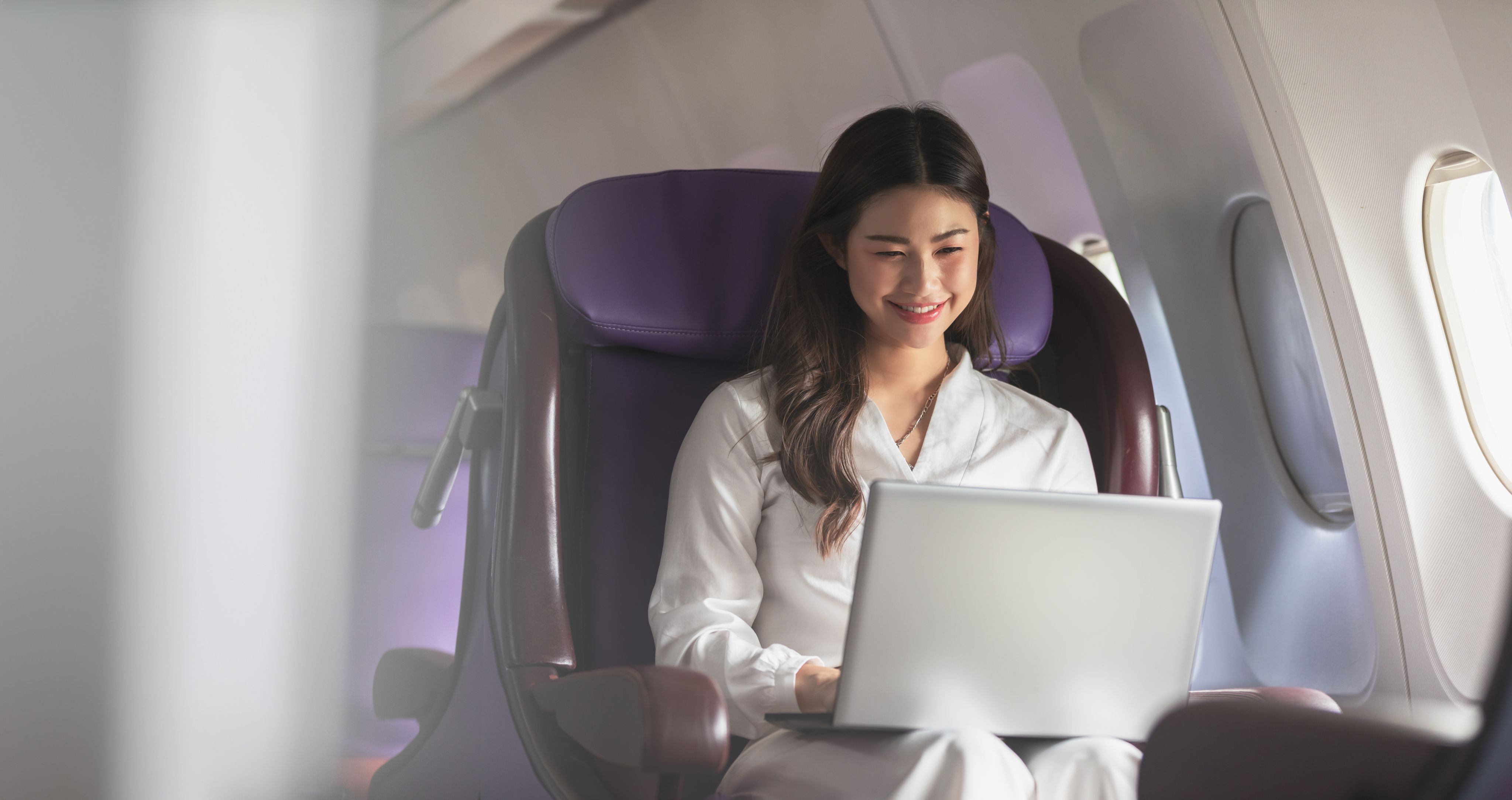AIR TIME
Travel managers, airlines, TMCs and consultants share their insights on corporate deals and airline relations in 2025


Adam Hickingbotham
Category manager, travel and office services, AtkinsRèalis
SECURING DEALS We’re very project based which means our high-volume routes can change a lot and we have to align our route deals with where our spend moves. It’s possible to negotiate deals where you’ve got a new project and there’s going to be a lot of travel – even without historic data – but it would be with an airline where you’ve shown your commitment in the past and they’ve seen evidence of your ability to shift share. Our deals are mostly discounts on specific routes and are largely based on volume, though we try not to overcommit even if we can see that volumes are going up on that route.
MORE TO IT Although most deals are a discount off our key routes, it’s not just about the discount, it’s about what else you can get. Refundable fares are really important for us. With some airlines where we don’t have a route deal we’ve still been able to get soft benefits like lounge access. We tend to put agreements in for two or three years and then we’ll renew them. We can’t do a five-year deal on a route because our needs could completely change.
SHIFTING SPEND We track our spend in quarterly meetings and work with employees to push preferred airlines. Some contracts ask us to flag the airline as preferred in our OBT. Last year we introduced a pop-up in the booking tool saying to travellers ‘do you realise we have a discounted deal?’ when they searched certain routes and it was very effective in shifting bookings over. But it can be a bit of a balancing act if you’ve got deals in places with two airlines on the same route.
"We’ve not turned NDC content on because, as a business, we are very client-based and our travel plans change so much"
POINTS MEAN PRIZES? Some airlines and groups operate points-based systems but we’re finding you can’t get a route deal with an airline and use the points programme of the wider joint venture it’s a part of. So we have to look at what’s better for us: a route deal where we really need it, or are we better off participating in the wider programme? Deciding how to use points can also be problematic. How do you distribute them? They don’t really work for us so we try to get discounts where we can.
PERSONAL POINTS We don’t restrict points so travellers can use them on their personal travel, but it does mean we see some people booking the airline or route that suits them best. Business class is where we have more of a challenge persuading people to move to our preferred airlines.
CONTENT CONCERNS We try and block basic or non-refundable fares in the OBT because they’re coming in cheaper than our deals. That’s when we have to explain that they might be a bit cheaper but it’s going to cost £300 or whatever to change it. We’ve not turned NDC content on for a similar reason – as a business, we are very client-based and our travel plans change so much. At the moment, managing NDC fares is challenging post-booking. It does cause noise though when people can see other fares on airlines’ websites.

Sofia Wolfes
Outsourced air category manager, Festive Road
WHAT AIRLINES WANT Airlines are looking at three main things [from corporates]: volume, market share and location. It used to be very volume-based in the past but now it’s more focused on market share and the possibility of shifting that spend. Airlines also look at where an organisation is based. If they are near one of the airline’s hubs, they are probably already flying with that airline a lot already and therefore might not need to give away discounts to win that business. But if there’s a lot of competition and pricing is aggressive then they can play that game. Airlines are looking for as little as $50k to $1million in spend [to consider discounts], but it really varies. In general, $1 milllion gives you more flexibility to negotiate. You might have leverage to negotiate or you might fall into a bucket of structured agreements – type A, B or C.
DEAL TYPES You can get creative, but there are five main types of deal. A percentage discount based on published fares – per route and class, is the most common. Then there are flat fares, but they’re not very common now. Pre-paid contracts is another type, with the amount you invest giving different levels of discount and amenity packages. Usually the discounts are a little higher because you’re putting that money up front. Spend-based reward programmes are not so much about saving money but about earning points based on spend and redeeming those for benefits such as upgrades, seat selection and lounge passes. And lastly, there are NDC exclusive discounts, and some airlines are giving higher discounts if you use NDC fares because they want to move people over.
"The incentive for airlines to give discounts is not as strong anymore. They’re loading the value bucket more and leveraging that"
DISCOUNT LEVELS The level of discount varies but it is consistently dropping. I’ve seen discounts as low as 1 per cent and as high as 50 per cent in the past but that was for very specific clients and very specific locations, and it was absolutely not the norm. After the pandemic airlines were just extending deals without looking at performance. But then more recently they have been decreasing their discounts and the thresholds have generally increased too. They [airlines] are blaming recovery, increasing salaries, jet fuel pricing, 2030 sustainability projects… and also premium leisure travel has increased. The incentive for airlines to give discounts is not as strong anymore.
EXTRA, EXTRA Airlines are now focusing more on value, which means ancillary services – soft dollar amounts which can give you status upgrades, lounge passes, wifi passes, waivers for name changes, cancellation fees. They’re loading the value bucket more and leveraging that.
DEMANDS Airlines want to see that they are preferenced in booking tools but that doesn’t mean you can’t preference others too. I’ve also seen airlines are checking more and more on how many travellers have a loyalty number and how many are using their app – they want to earn loyalty and get more business not only on the corporate side but on the leisure side too. It [loyalty enrolment] could be a goal for the organisation to accomplish during the year.
MEETING TARGETS I haven’t seen airlines being harsher [since the pandemic]. The worst case scenario is that they would lower your discounts but they’re doing that anyway. You have to work on meeting the targets but there is no penalisation. As a travel manager, you have a relationship with the airline, you track progress together and work on it. You don’t get to the end of the year and suddenly find you’ve missed it. You need to be good partners.

Tom Maynard
Head of global corporate sales, Virgin Atlantic
GIVE AND TAKE Our primary focus when negotiating corporate agreements is the incremental revenue opportunity for ourselves and our JV partners. Our primary measure of success of an agreement is market share and fulfilment of share commitments. Preferencing within an OBT is clearly important but access to the travel community within the corporate is equally important – access to travellers, EAs and senior leaders so that we can engage, educate and influence in order to build support and loyalty to Virgin Atlantic and our partners.
DEAL OR NO DEAL? We deploy a number of different corporate programmes depending on the level of spend and opportunity, plus the level of support. This ranges from our SME programme (Bluebiz) that provides points for every pound of spend that can be used to purchase flights, to percentage discounts off published fares on specific routes with larger spend organisations. We do still have a number of fixed fare agreements in place with some of our largest clients but these are being limited/withdrawn and moved to percentage discounts in all but the most exceptional cases. Sustainability and ESG are becoming a bigger part of the RFP process, but pricing is still [the] ultimate focus of RFP outcomes.
"We are being more discerning around contract performance... but we are still looking to attract more corporate customers"
SOFT BENEFITS Loyalty remains a key driver in the buying behaviour of travellers. We deploy a number of loyalty promotions to corporates including discretionary cards, status matches or bespoke offers such as Gold After First Flight to encourage support to VS and our JV partners. We support new agreements with a host of activities, including tours of our London Heathrow facilities, including the Upper Class Wing, Clubhouse and onboard product, and encourage our corporate partners to allow for travel fairs and traveller engagement events.
ARE AIRLINES MORE DISCERNING? Yes and no. We are being more discerning around contract performance and ensuring that corporations deliver on their commitments, and adjusting discounts or even removing discounts if contractual targets aren’t met, but we are still looking to attract more corporate customers to Virgin Atlantic. Our new business team that was created in 2024 is testament to our focus on the corporate channel and our desire to win more business and have programmes available for all size of travel budgets.

Anonymous travel manager
SURCHARGES One of the big things we’ve noticed in the last few years is that airline surcharges have become more and more prominent and take up a larger proportion of the fare, particularly on certain sectors like transatlantic and transpacific. For some routes, those airline surcharges are up to 20 per cent or more of the fare and that’s a problem for two reasons. Firstly, our corporate discounts do not apply to the surcharge. And secondly, some airlines aren’t giving us credit for the surcharge spend. Even though that spend is going straight in the airline’s pocket, if we have a revenue target, they only count the fare towards it – not the 20 per cent surcharge. So we are saying to airlines that if their surcharges are growing, then our net effective discount is dropping. “If you increase your surcharges, we expect an increase in our discount,” is what we're saying. That's a big deal for us.
COMMODITISATION Another thing that frustrates me is that airlines say they don't want their product to be commoditised, but they have commoditised everything they can within that product. So you pay for baggage, you pay for your seat allocation, you might pay for your lounge access, you pay for in some instances wifi… but we're not allowed to sit down and buy them on price. Take Lufthansa as an example. They have multiple types of seats within their new business class and they’re charging to choose those on top of the fare. If you want a window seat, you’re probably going to have to pay extra. That’s created an issue for me and my company because we now have to create a policy around how much you can spend to select a seat. And we're not talking $20 or $30, we're talking $200 or $300.
"Airlines are often looking for something like 90 per cent of your travellers to be members of their frequent flyer programmes"
IN DEVELOPMENT When NDC was launched, we [buyers] were told airlines could give us our own bespoke fares, but 15 years later it is still getting momentum and I’m not aware of any client specific fares out there still. We’re seeing continuous pricing now and they [airlines] are arguing there’s value in that and I think there probably is, but my worry is that at some point the value proposition disappears and it becomes a cost. So rather than you saving money between these two [fare] points, they're going to move between points more quickly and it ends up being a cost.
LOYALTY MOVES Airlines are often looking for something like 90 per cent of your travellers to be members of their frequent flyer programmes. They want their data, their information, so they can market to them directly, hoping that they will choose them and possibly even choose them outside of your corporate policy. We accept there is value in those programmes for the travellers and us as a corporate – they get lounge access, high priority on the waitlist, etc – as well as the airline, so there is a value proposition on both sides.
BRITISH AIRWAYS I’m surprised they didn’t move to a spend-based programme sooner. I know there was a lot of noise around it but the US carriers all did it three, four, five years ago. Why should you get your status on how far you fly rather than how much you pay? We tend to fly at the front of the plane and we tend to buy quite late too so overall it’s not going to have much impact for us. But advance buying is one of the behaviours we are trying to influence at the moment because it’s been relatively poor.

Anonymous TMC contributor
TOUGH TARGETS Corporates are generally finding airline deals more difficult to secure. We know there are capacity issues and airlines are waiting for new aircraft, and that leisure travel came back strongly, but the deals they’re offering seem to be quite weak and have big targets.
LIGHT NEEDS NDC has also been thrown into the mix regardless of its impact on TMCs and clients. It’s all about the airlines wanting to know and own the client. NDC and loyalty are really challenging compliance. Once an airlines ‘knows’ you, they offer you what they want you to buy, not necessarily what the client wants. We have a lot of discussion internally about needing to have NDC, but what do clients want it for? Light fares. That’s been a big topic with Lufthansa and light fares in home markets, but how many times are clients actually booking those light fares? It’s not much. You can’t change it, you can’t take a bag, and when you look at it, it’s a very small proportion [of bookings]. They say they want NDC, but it’s almost like a comfort blanket for them as they don’t use it. Our strategy is to get NDC content through the GDSs. We looked at APIs but it’s a colossal investment. One of our main hopes for NDC was for airlines to provide discounts with bundled content added such as free fast track security, lounge access or no seat selection charges. While this hasn’t materialised yet, it would be a valuable addition for clients securing deals through NDC.
"Airlines are still sectorising their fares, meaning different agents have access to different fares"
FARES MOVEMENT We’ve seen some crazy business class fares in recent years but that’s all settled down now. London-New York is always competitive, as are Middle East routes. We’ve seen some downtrading from business class but generally, from Europe, business class long-haul is holding steady and even growing.
SECTOR SPECIFIC Airlines are still sectorising their fares, meaning different agents have access to different fares. Airlines still put leisure and corporate travel agents in different buckets. One TMC might get a wider range of fares to service their clients because they might have a leisure arm, for instance, or a leisure agency might serve some SMEs for business travel. As a TMC we want access to all fare types across the board. It’s something that we’ve talked about for a while but it’s not moving. An airline might tell us we can’t have their entertainment fares because you’ve got to have 20 entertainment clients, or we can’t have their charity fares because we don’t do enough. If revenue management wants to sell a ticket at that price with those conditions, let all agents have it because we all have some clients that would benefit from that fare. If you’re a TMC bidding for an entertainment client and you don’t have those fares yet, it’s Catch-22. Not all airlines do it and some are much easier to work with than others, but in the end it’s not helping clients. They just want the best fare for them that suits their needs.

Ian Flint
Founder and managing director, Inform Logistics
HOW MUCH? There is no particular spend threshold that airlines are looking at. It’s more about what you will commit to, how will you monitor it, and how will you mandate it within your company. A lot of clients are actually terrible at mandating and airlines will really look at that. What’s the point for them of giving a really good discount if they’re not going to get the business? Corporates need to look at the key routes they travel, the class of travel, what have you done in the past, and then work out with the airline a strong package that is beneficial to both.
PREMIUM DEMANDS Some corporates want to negotiate business class fares and ensure that airlines can guarantee access to preferred inventory. In some contracts they want included a sort of automatic upgrade if business class seats aren't available and that’s to ensure traveller satisfaction. But like all negotiations, it requires a balance in price, availability and flexibility. There’s no point having a really good deal on a particular route if you can’t access the seats. Corporates want to be sure they can get their people on that flight and that might mean accepting a lower discount.
"Airlines need to understand that corporates will want to maximise savings where they can and take advantage of any seasonal or NDC rate offered that is better than their corporate rate"
CAPACITY CRUNCH In the past, corporates were able to throw their weight around and say ‘we have a volume of £X million and we want the best deal’, but there’s now a balance between whether or not there is availability. There’s a capacity problem. Sometimes we need to look at alternative route strategies for companies because there isn't the capability on that particular route. London-Washington has always been a very busy route, for example.
FARE FLUCTUATIONS Many different things can affect an airline programme but right now many clients are looking very carefully at NDC, mainly because there is a potential saving there. It’s been sold to them that adopting NDC can achieve savings of anything from 5 per cent to 18 per cent – which is one of the figures I have seen – through the elimination of GDS surcharges and access to exclusive fares. A lot of NDC uses continuous pricing so there’s a lot of movement in fares and those fares can be lower than the negotiated fare. But if you can say to the airline ‘we’ve used X per cent of your corporate rates but also X per cent of your dynamic rates’ that’s a lot better than saying you’re using another airline.
MUTUAL UNDERSTANDING Airlines need to appreciate that corporates will mandate policies and review how well they're doing with their suppliers, but also that they will want to maximise savings where they can and take advantage of any seasonal or NDC rate offered that is better than the corporate rate they have. It comes down to strategy: how stringent does the client want to be in controlling its travel programme? And how flexible will the airline be with the understanding that better fares are available than the corporate rate they’ve negotiated, and that corporates will consume them?

Dean Mitchell
Supplier relations manager, ATPI
DEAL CLINCHER The factors influencing an airline’s decision to offer a corporate discount vary by carrier and may apply to an entire network or just specific routes. Volume and route preferences play a significant role, but high spending alone doesn’t guarantee a discount. Instead, companies must demonstrate their ability to shift market share to that specific airline. If this intent is unclear, airlines can sometimes be reluctant to offer these discounts. They won’t offer discounts simply due to frequent usage as they view it as revenue dilution.
ON THE TABLE Deals vary from airline to airline, but typically involve a set percentage discount off the published fare, and is determined by potential booking volume. However, for media and marine clients, discounts are not always about price. Instead, they can include added benefits and flexibility such as changes to bookings, refunds or extra baggage allowances. One of our main hopes for NDC was for airlines to provide discounts with bundled content added such as free fast track security, lounge access or no seat selection charges. While this hasn’t materialised yet, it would be a valuable addition for clients securing deals through NDC.
"Airlines have fewer premium seats available for corporate bookings now, reducing the airline’s willingness to offer discounts"
TMC INVOLVEMENT We help our clients by providing 12 to 24 months of booking data and volume trends with the airline. This information helps demonstrate the company’s ability to shift market share, allowing airlines to see the long-term value that the company can bring. We offer early intelligence on what is possible, however ultimately, success depends on the client’s commitment to building a long-term relationship with the airline.
KEEPING TRACK Agreements are simple to track. Normally airlines provide a specific corporate deal identifier which includes a unique reference or code to track and manage corporate agreements between the business and airlines. We then input it into each ticket which allows us and the airline to generate a monthly report, ensuring the client is on track to meet targets and receive all the negotiated benefits.
CHANGING HABITS Airline corporate discounting strategies have definitely changed post-pandemic. Since the pandemic there has been a high demand for premium leisure travel so airlines have fewer premium seats available for corporate bookings, reducing the airline’s willingness to offer discounts. As a result, fares have increased significantly, with our average premium return fare to New York rising over 20 per cent since the pandemic.













